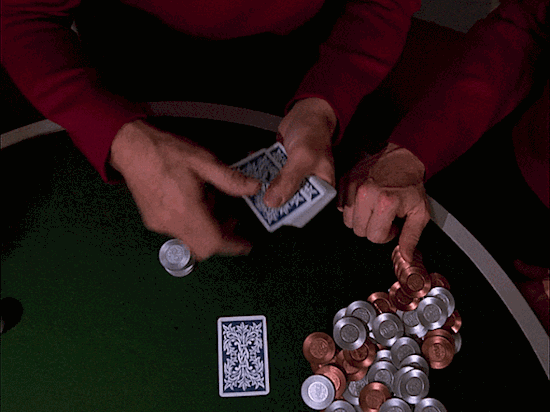All Good Things: A Love Letter to 'Star Trek: The Next Generation'
Twenty-five years ago, Star Trek: The Next Generation aired its final episode. Set nearly a century after Star Trek: The Original Series, it had stepped away from the “cowboys in space” motif towards a more thoughtful tone. Despite a rough first few seasons, The Next Generation grew, improved, and eventually became one of the most acclaimed iterations of Star Trek to date. The series ended with the season seven finale called “All Good Things,” and helped cement The Next Generation’s role at the top of the Star Trek heap. The show ended at the height of its popularity, winning an Emmy nomination for Outstanding Drama Series (the first time any syndicated show had been nominated), and the finale won the 1995 Hugo Award for Best Dramatic Presentation. While the recent Game of Thrones finale defined itself as bittersweet, “All Good Things” was the embodiment of a feel-good ending. Described by writer-producer Ronald Moore as “a love letter to the series,” it showcased all the best of the series from its stellar cast (captained by British thespian Sir Patrick Stewart) to its core message about humanity.
Besides the obvious speculation about technology, science fiction at its best has always fundamentally been an examination of what it means to be human, examining or critiquing our society through the lens of other forms of life. Creator Gene Roddenberry’s original vision for Star Trek differed sharply from the current trend towards dark, gritty, and grimdark fiction. Rather than dystopian futurism, Roddenberry’s vision instead was one of a technological utopia: one where no one lacks for money (which doesn’t exist), or suffer from disease or poverty — a future where diversity is the norm rather than an ongoing battle. Roddenberry’s vision is perhaps best defined through the Star Trek opening mantra:
While the execution and success of that vision have varied throughout the many iterations of Star Trek (the most recent series Star Trek: Discovery has deliberately moved away from it, for better or worse), The Next Generation was likely the show that demonstrated it best.
“All Good Things” spanned across 30 years in-universe as Captain Jean-Luc Picard (Stewart) finds himself inexplicably traveling between three distinct time periods — his present, 7 years in his past (revisiting the time period of the show’s own pilot, “Encounter at Farpoint”), and 25 years in his future where he has retired from Starfleet Command to tend the family vineyard. It becomes apparent that this is no mere temporal anomaly when the omnipotent Q (John DeLancie) enters the stage and informs Picard that his assumption about the conclusion of the trial from “Encounter at Farpoint” was false. Q had not reached a verdict until now: humanity has been found lacking and sentenced to extinction.
Bringing back this trial from the very beginning of the show provided both a natural bookend for the series and incredibly high stakes. As Picard travels between these three time periods, he must find a way to bring the crews together. While this is easy in the present, the crew from the past does not yet know or trust him, and the crew from the future fears that his ramblings are due to the progression of a neurodegenerative disease with which he has been diagnosed. As the episode progressed, the jumps between time periods became even more jarring. Shots were shorter and deliberately vague so that it was hard to tell which iteration of a character was speaking. Picard must fight through this confusion to make his crews trust each other and save humanity (this theme of trust and faith seems to be something that they are going to revisit in the upcoming CBS Star Trek: Picard series).
Taking the chance to look both forward and backward was the perfect conclusion for the show. It encouraged the audience to appreciate the present, treasure the past good times, and anticipate all that was left to come. It looked back at what The Next Generation had been and what Star Trek could still become. By the time “All Good Things” aired, the franchise had a bright future with Star Trek: Deep Space Nine already wrapping up its second season and the first film to feature The Next Generation crew, Star Trek: Generations, was in the midst of filming. Another series was on the horizon (Star Trek: Voyager started airing in 1995), and the cast of the Enterprise-D would star in three feature films after Generations. Little could they know that twenty-five years later, there have been several new series, an entire film franchise reboot, and Stewart himself will be returning to his iconic role as Captain Picard in roughly the same time period at the future part of “All Good Things.”
Despite the high stakes, “All Good Things” was not concluded through force of arms. Rather than rallying all troops and launching a final assault on the Q Continuum, Picard saves the day through a moment of pure enlightenment, deeming the human race worthy. Despite the animosity that had festered between Picard and Q throughout the show, at the end of the finale they seem to express a mutual, if begrudging, respect for each other. Although Roddenberry didn’t live to see the end of The Next Generation (he passed away in 1991), it seems safe to say that he would have been proud of the final message of the show.
Source: filmschoolrejects.com

